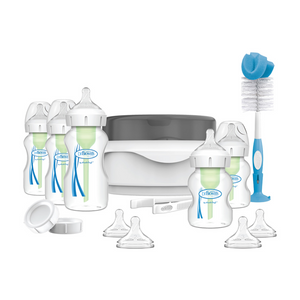
Should I give my baby a dummy?
Dummies... soothers... pacifiers. Whatever you call them, they have been a staple in the parenting toolkit for generations.
There are many opinions around about whether or not you should introduce a dummy or soother to your baby. And if you're undecided, then you might feel more pressure than necessary about their use! So, let's explore the advantages, potential drawbacks, and key facts about dummy use to help to make an informed decision.
Benefits of Using Dummies
Let's start with the benefits of using a dummy with your baby. They're not just an incredible way to significantly calm your baby, but they can also be an aid to help your baby go to sleep. The act of sucking is a relaxing motion to small children and as such, helps them in drifting away for both naps and night time slumber.
Studies have also shown that using a dummy during minor medical procedures can help to ease pain and discomfort. This includes immunisations or blood tests.
Some research also suggests that using a dummy during sleep can also reduce the risk of SIDS (Sudden Infant Death Syndrome). Although the exact reason for this is not understood, some theories are that the dummy helps in keeping airways open during the night, or ensures that the baby is in a safer sleeping position when settled with their dummy.
Potential Drawbacks of Dummy Use
Long term use of dummies can potentially lead to dental problems such as misalignment of teeth and changes in the shape of the mouth. It is important to limit dummy use as the child grows older, especially if they start to become more dependant on it. This can also make it more challenging to wean your baby off their dummy when use starts to be disruptive to their routine.
To maintain your child's dental health and prevent potential issues like misalignment of teeth, it's recommended to gradually reduce dummy use as they grow older. This can also help avoid dependency on the dummy and make the weaning process smoother.
Considerations when using a dummies
When breastfeeding, it is often recommended to wait until feeding is well-established (usually around one month) before introducing a dummy. This helps to avoid potential nipple confusion and ensure that the baby is effectively breastfeeding.
Always make sure that you keep your dummies sterile and clean as part of your daily routine. This will help to avoid infections. Also make sure you check for any wear and tear or damage as this could become a choking hazard.
And speaking of safety, never tie a dummy around a baby’s neck and always ensure that dummy clips are not potential hazards with beads and other decorative elements that can be easily detached or put into the babies mouth.
Shop our range of Soothers and Dummies online here.


